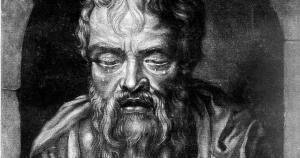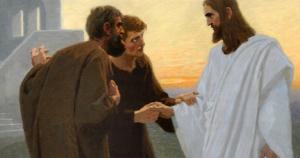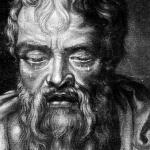 To get us to adulthood, God speaks in signs to His children. He wishes us to think, is here to lead us in a personal relationship with His Spirit, and so is clear where He must be, but often is cryptic where we need space to learn.
To get us to adulthood, God speaks in signs to His children. He wishes us to think, is here to lead us in a personal relationship with His Spirit, and so is clear where He must be, but often is cryptic where we need space to learn.
Jesus found two men wandering away from Jerusalem and instead of meeting their felt need, He met their deepest need. They were broken that He was dead, but only because they had misunderstood the nature of Scripture, God’s fundamental plan, and Jesus’ mission. As a result, for a bit, Jesus hid from them, taught them, and only after they had a chance to learn did He reveal Himself to them.
The One God revealed Himself and they worshipped, but only after God had allowed them time to learn without being overwhelmed. The burning bush was such an image- remarkable, but not so overwhelming that dialog failed. You can talk to a burning bush, but if not consumed by a direct vision of God, would only be capable of worship.
God is all that.
 A singularly stupid argument is that monotheists (Judaism, Platonism, Christianity, Islam et al) are just polytheist people with one more god. God is as much like a god as zebras are like rocks: God and gods are supernatural while zebras and rocks are both material. However, God is (by definition) unique: you cannot have two All Powerful beings without immediate logical contradiction, but you can have a multitude of gods.
A singularly stupid argument is that monotheists (Judaism, Platonism, Christianity, Islam et al) are just polytheist people with one more god. God is as much like a god as zebras are like rocks: God and gods are supernatural while zebras and rocks are both material. However, God is (by definition) unique: you cannot have two All Powerful beings without immediate logical contradiction, but you can have a multitude of gods.
I once pointed this out and was accused of saying this to defend the Christian version of God. God is, of all beings, least in need of any defense in Himself. He is utterly secure in Himself and patiently waits thousands of years for us to make our errors. If the Last Day is coming, nobody will be able to accuse God of rushing. However, if I were not a Christian, then like Plato I would be a “high pagan:” one who saw truth in the old myths and legends, but not total truth. Plato, his teacher Socrates, and a few of the thinkers before Socrates saw that gods like Zeus were a mixed bag: some deep truths but a God mixed up with misidentification with a god. There was Zeus and “zeus:” heavenly and earthly God and god. There is a duality to any human story: image of God producing divine insight and lame falling back from the good, the truth, and beauty. Of all the philosophers before Socrates and Plato, the curmudgeon of Ephesus, Heraclitus, saw things best.
The work of a man is often to find the truth buried in the additions of the world, our flesh, or devils! Or so Heraclitus thought. He knew the story of gods often were excuses to sexuality immortality. People always have used religion to cover for broken desire, the modern Episcopal Church USA is nothing new. As Heraclitus said of those who were careful in getting the ritual right, and hoping to attract the young people: (242) “The secret rites practised among men are celebrated in an unholy manner.” Things do not change and the big errors have been recognized for a long time.
Heraclitus understood that the Divine Logos spoke, even in places like Delphi, where the grifters and the demons made a hash of things. Demons deceive, grifters tell us what we want to hear: the Lord God gives a sign. As Heraclitus said:
(244) The lord whose oracle is in Delphi neither speaks out nor conceals, but gives a sign.
Even the Jewish people, given the revelation of God, took centuries to learn the simple truth: God is no god. The initial concept, like the wheel, was harder to grasp than the applications that would roll out from the discovery.
Sometimes I am asked why God let us misunderstand: why not speak clearly?
God can only speak the deep truth in signs, because God must use human language. No human language does more than come close to truth: all is sign. God can say: “Love your enemies.” We see the sign, so clear seemingly, and proceed for centuries not to follow the sign. Language is not nearly as plain as we think.
Sometimes, in fact, the images of Scripture, the Rock, the Anchor, the Lily of the Valley, are easier to decipher for poor broken us, than “plain” commands. All is icon, all can become idol, all is sign, all points to the Signer.
——————————————-
*The Pre-Socratic Philosophers, editors Kirk, Raven, and Schofield, 2013.
  












